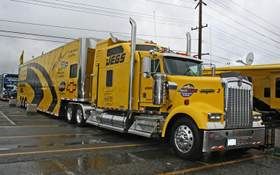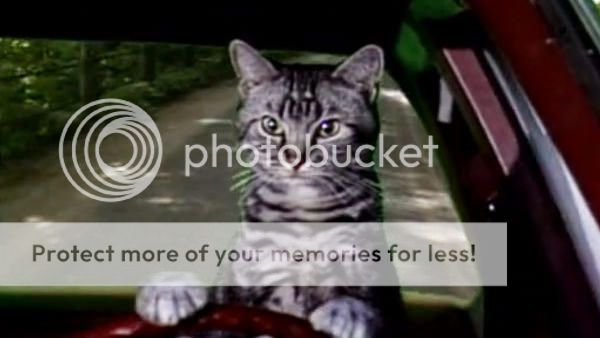Would My Medical History (ADHD, Depression, Anxiety) Prevent Me From Passing The DOT Physical?
Topic 13529 | Page 1
Two schools of thought on this.
If you are off the meds AT LEAST 6 MONTHS, they will not pop on a drug screen (hair, which is becoming more popular), 30 days for a urine screen.
Adderall and Lorzepam are two NO NO's for CMV drivers. Certain SSRI's are acceptable, with a statement from the prescribing physician. This seems to vary by company - and is more a factor of INSURANCE RISK from the side effects of the meds, than a company worrying about a drivers mental health (or so it seems).
Some people just won't declare, and not worry about it - assuming you have been off the meds long enough that they won't pop on ANY DRUG SCREEN.
Some people will declare, and have a letter from their physician, backing up the fact that they have been off them.
The companies we see most often here (Swift & Prime), have recently sent members of the board home for 30 days to get off the meds they were on when they came to orientation.
The new 2016 FMCSA Physical forms2, go into greater (more intrusive) details on mental health issues. If you response HONESTLY, then you are going to need to provide statements from your doctor as to the condition, treatment, etc.. If you are off the meds, the statement is going to need to indicate this.
Most folks here would tell you not to LIE on applications or medical forms - and I'm not going to be the one to recommend lying either.
While mental health issues no longer carry a lot of the stigma they have in the past, there is also a general trend towards self-diagnosis. people that have these issues should truly not have to suffer with them, if medicine can provide chemical relief. On the other hand, many of these "chemical miracles" have side effects that could make it dangerous to drive an 80,000 rig down public streets.
Rick
CSA:
Compliance, Safety, Accountability (CSA)
The CSA is a Federal Motor Carrier Safety Administration (FMCSA) initiative to improve large truck and bus safety and ultimately reduce crashes, injuries, and fatalities that are related to commercial motor vehicle
FMCSA:
Federal Motor Carrier Safety Administration
The FMCSA was established within the Department of Transportation on January 1, 2000. Their primary mission is to prevent commercial motor vehicle-related fatalities and injuries.
What Does The FMCSA Do?
- Commercial Drivers' Licenses
- Data and Analysis
- Regulatory Compliance and Enforcement
- Research and Technology
- Safety Assistance
- Support and Information Sharing
DOT:
Department Of Transportation
A department of the federal executive branch responsible for the national highways and for railroad and airline safety. It also manages Amtrak, the national railroad system, and the Coast Guard.
State and Federal DOT Officers are responsible for commercial vehicle enforcement. "The truck police" you could call them.
CMV:
Commercial Motor Vehicle
A CMV is a vehicle that is used as part of a business, is involved in interstate commerce, and may fit any of these descriptions:
- Weighs 10,001 pounds or more
- Has a gross vehicle weight rating or gross combination weight rating of 10,001 pounds or more
- Is designed or used to transport 16 or more passengers (including the driver) not for compensation
- Is designed or used to transport 9 or more passengers (including the driver) for compensation
- Is transporting hazardous materials in a quantity requiring placards
Fm:
Dispatcher, Fleet Manager, Driver Manager
The primary person a driver communicates with at his/her company. A dispatcher can play many roles, depending on the company's structure. Dispatchers may assign freight, file requests for home time, relay messages between the driver and management, inform customer service of any delays, change appointment times, and report information to the load planners.
Thanks for the info Rick! This form makes it clear that I'll have no choice but to disclose. I was hoping nobody would actually bother to ask about my history, but apparently that was just wishful thinking. So I guess that means I'll be at the mercy of whoever ends up evaluating the form.
Can anybody speak from experience as to how the DOT actually handles these forms? Does reporting that you experienced problems in the past result in an automatic red stamp, or are they more lenient than that?
DOT:
Department Of Transportation
A department of the federal executive branch responsible for the national highways and for railroad and airline safety. It also manages Amtrak, the national railroad system, and the Coast Guard.
State and Federal DOT Officers are responsible for commercial vehicle enforcement. "The truck police" you could call them.
It's not a matter of "mercy" I would think.
If you're just bat-feces crazy without the meds, then it would be a serious issue to not be taking them. If the meds happen to be something that a company deems unacceptable - and this apparently includes meds that are NOT ON the FMCSA "no fly list" - we've seen members of this board recently being sent home for 30 days to get off them.
If you choose to disclose, show up for your physical with a letter from your doctor, stating the diagnosis, what was prescribed, the fact that you have discontinued use of them, and are not suffering and side/ill effects from not being on them.
As I mentioned - the adderall and lorzepam are definite no-no's, and you will pop hot on a hair test (though not on a urine if you've been of them for 30+ days) - so if you happen to go with a company that does hair testing, you are going to have to document and justify why they're showing up.
You didn't mention which anti-depressant you were on, so I couldn't look it up.
Even with a past diagnosis - it shouldn't pose a real issue. You stated that you asked for the meds, because you though they might help, and decided to get off them and handle stuff on your own. This is likely a good thing - if the symptoms were mild enough that you are handling stuff on your own now.
The key if you disclose, is to DOCUMENT. In a worse case scenario - you may get hung up to get more information from your doctor (have it faxed or fedex'd in) in order to proceed forward in the process. Make sure you speak with him before you go - so he's prepared to do this for you, without making you wait too long, or come home for an office visit.
Rick
CSA:
Compliance, Safety, Accountability (CSA)
The CSA is a Federal Motor Carrier Safety Administration (FMCSA) initiative to improve large truck and bus safety and ultimately reduce crashes, injuries, and fatalities that are related to commercial motor vehicle
FMCSA:
Federal Motor Carrier Safety Administration
The FMCSA was established within the Department of Transportation on January 1, 2000. Their primary mission is to prevent commercial motor vehicle-related fatalities and injuries.
What Does The FMCSA Do?
- Commercial Drivers' Licenses
- Data and Analysis
- Regulatory Compliance and Enforcement
- Research and Technology
- Safety Assistance
- Support and Information Sharing
Fm:
Dispatcher, Fleet Manager, Driver Manager
The primary person a driver communicates with at his/her company. A dispatcher can play many roles, depending on the company's structure. Dispatchers may assign freight, file requests for home time, relay messages between the driver and management, inform customer service of any delays, change appointment times, and report information to the load planners.OWI:
Operating While Intoxicated
OOS:
When a violation by either a driver or company is confirmed, an out-of-service order removes either the driver or the vehicle from the roadway until the violation is corrected.
The new 2016 FMCSA Physical forms2, go into greater (more intrusive) details on mental health issues.
Holy crap those really are more intrusive! Yikes!
CSA:
Compliance, Safety, Accountability (CSA)
The CSA is a Federal Motor Carrier Safety Administration (FMCSA) initiative to improve large truck and bus safety and ultimately reduce crashes, injuries, and fatalities that are related to commercial motor vehicle
FMCSA:
Federal Motor Carrier Safety Administration
The FMCSA was established within the Department of Transportation on January 1, 2000. Their primary mission is to prevent commercial motor vehicle-related fatalities and injuries.
What Does The FMCSA Do?
- Commercial Drivers' Licenses
- Data and Analysis
- Regulatory Compliance and Enforcement
- Research and Technology
- Safety Assistance
- Support and Information Sharing
DOT:
Department Of Transportation
A department of the federal executive branch responsible for the national highways and for railroad and airline safety. It also manages Amtrak, the national railroad system, and the Coast Guard.
State and Federal DOT Officers are responsible for commercial vehicle enforcement. "The truck police" you could call them.
Fm:
Dispatcher, Fleet Manager, Driver Manager
The primary person a driver communicates with at his/her company. A dispatcher can play many roles, depending on the company's structure. Dispatchers may assign freight, file requests for home time, relay messages between the driver and management, inform customer service of any delays, change appointment times, and report information to the load planners.HOS:
Hours Of Service
HOS refers to the logbook hours of service regulations.
You seem to know your stuff - thanks again for helping me figure everything out.
I'm not too worried about the meds, since I will have been off everything for at least 6 months before getting tested. Then again, if I find a company that only does urine tests it could allow me to get rolling sooner.
Hopefully by getting all my paperwork lined up beforehand, I would have a decent shot at making it through the exam unscathed. I found out that my doc is actually a registered examiner, so I'll be bouncing some of these questions off him before I fly off to some academy.
One other thing. I noticed that the form you linked to in your first reply is different than the one mentioned in the DOT Physical wiki article (https://www.truckingtruth.com/wiki/topic-1/dot-physical). Your form seems a little more invasive, at least in terms of the mental health part.
Is this just the newer version of the same form, or do these serve slightly different purposes?
DOT:
Department Of Transportation
A department of the federal executive branch responsible for the national highways and for railroad and airline safety. It also manages Amtrak, the national railroad system, and the Coast Guard.
State and Federal DOT Officers are responsible for commercial vehicle enforcement. "The truck police" you could call them.

Is this just the newer version of the same form, or do these serve slightly different purposes?
It is the newer version of the same form.
Thanks for the info Rick! This form makes it clear that I'll have no choice but to disclose. I was hoping nobody would actually bother to ask about my history, but apparently that was just wishful thinking. So I guess that means I'll be at the mercy of whoever ends up evaluating the form.
Can anybody speak from experience as to how the DOT actually handles these forms? Does reporting that you experienced problems in the past result in an automatic red stamp, or are they more lenient than that?
Newer version of form that is REQUIRED TO BE USED after January 1, 2016.
I understand the impetus of being "more intrusive", is to keep our roads safer.
No "automatic red stamp" per se.
If the condition (or current medications) will CURRENTLY AFFECT your ability to safely operate a CMV , you will be disqualified.
The key here, is to DOCUMENT any question you answered yes to.
The EXAM ITSELF is usually not all that detailed. My last one, it took longer to walk down to the bathroom, fill the cup and walk back - than the actual exam took. The one before that, I had to get on BP meds and get my BP into the normal range, before I could pass (lost 60lbs and was able to come off the meds).
Pass of fail, I believe these get uploaded to FMCSA now - so you want to be consistent in your answers each time you fill one out.
Some of the failures, are ballbusting ME's that don't want to risk potential liability, by passing someone with a reported condition that hasn't been documented - sometimes, they just won't pass you at all.
Most of the recent fails we've seen from board members, center around pysch meds. the most recent ones were sent home for 30 days to get off the meds, and invited to return.
Rick
CSA:
Compliance, Safety, Accountability (CSA)
The CSA is a Federal Motor Carrier Safety Administration (FMCSA) initiative to improve large truck and bus safety and ultimately reduce crashes, injuries, and fatalities that are related to commercial motor vehicle
FMCSA:
Federal Motor Carrier Safety Administration
The FMCSA was established within the Department of Transportation on January 1, 2000. Their primary mission is to prevent commercial motor vehicle-related fatalities and injuries.
What Does The FMCSA Do?
- Commercial Drivers' Licenses
- Data and Analysis
- Regulatory Compliance and Enforcement
- Research and Technology
- Safety Assistance
- Support and Information Sharing
DOT:
Department Of Transportation
A department of the federal executive branch responsible for the national highways and for railroad and airline safety. It also manages Amtrak, the national railroad system, and the Coast Guard.
State and Federal DOT Officers are responsible for commercial vehicle enforcement. "The truck police" you could call them.
CMV:
Commercial Motor Vehicle
A CMV is a vehicle that is used as part of a business, is involved in interstate commerce, and may fit any of these descriptions:
- Weighs 10,001 pounds or more
- Has a gross vehicle weight rating or gross combination weight rating of 10,001 pounds or more
- Is designed or used to transport 16 or more passengers (including the driver) not for compensation
- Is designed or used to transport 9 or more passengers (including the driver) for compensation
- Is transporting hazardous materials in a quantity requiring placards
Fm:
Dispatcher, Fleet Manager, Driver Manager
The primary person a driver communicates with at his/her company. A dispatcher can play many roles, depending on the company's structure. Dispatchers may assign freight, file requests for home time, relay messages between the driver and management, inform customer service of any delays, change appointment times, and report information to the load planners.
The key here, is to DOCUMENT any question you answered yes to.
Just curious -- how would I document my yes answer to the "do you drink alcohol" question?
I would hope that the doctor would just ask you how often and as long as you weren't an addict, that would suffice. Because I do drink, but it's usually only like once or twice a week, when I go out to dinner. I have no idea how I would document that in order to prove it, though.
TWIC:
Transportation Worker Identification Credential
Truck drivers who regularly pick up from or deliver to the shipping ports will often be required to carry a TWIC card.
Your TWIC is a tamper-resistant biometric card which acts as both your identification in secure areas, as well as an indicator of you having passed the necessary security clearance. TWIC cards are valid for five years. The issuance of TWIC cards is overseen by the Transportation Security Administration and the Department of Homeland Security.

The key here, is to DOCUMENT any question you answered yes to.
Just curious -- how would I document my yes answer to the "do you drink alcohol" question?
I would hope that the doctor would just ask you how often and as long as you weren't an addict, that would suffice. Because I do drink, but it's usually only like once or twice a week, when I go out to dinner. I have no idea how I would document that in order to prove it, though.
I asked my ME the same question he said do you have to drink every day or feel the need to drink every day? I said no he said then put down no because it's not a medical condition.
As for having ADHD, I have that, they just want to make shere you can be safe. My info is a little old from this point on but none of the ADHD meds were approved by the dot for use last time I checked so make shere you, can function off meds. I have a pilots license sense 2002 and have been off meds sense then. Because I could not be on them and get a flight medical done. So just make shere you can cope with out them. Good luck.
DOT:
Department Of Transportation
A department of the federal executive branch responsible for the national highways and for railroad and airline safety. It also manages Amtrak, the national railroad system, and the Coast Guard.
State and Federal DOT Officers are responsible for commercial vehicle enforcement. "The truck police" you could call them.
TWIC:
Transportation Worker Identification Credential
Truck drivers who regularly pick up from or deliver to the shipping ports will often be required to carry a TWIC card.
Your TWIC is a tamper-resistant biometric card which acts as both your identification in secure areas, as well as an indicator of you having passed the necessary security clearance. TWIC cards are valid for five years. The issuance of TWIC cards is overseen by the Transportation Security Administration and the Department of Homeland Security.
New Reply:
New! Check out our help videos for a better understanding of our forum features

















Preview:








 TT On Facebook
TT On Facebook
Hey guys, I want to get into trucking but I'm trying to figure out if my medical history is likely to complicate things much.
Over recent years I have occasionally asked my doctor to put me on various medications such as Adderall (hoping it would help me to stay motivated as a freelance programmer), antidepressants (for moderate depression; only took them for a few months), and lorazepam (for occasional social anxiety). I basically self-diagnosed myself with these conditions, and my doctor had no problem writing the scripts. I wanted to see if the meds would make life any easier, but over time I've gotten to the point where I prefer handling things on my own. Some people truly need these medications, but for me, I think the problems were mostly in my head.
For the last few months I've been medication free, but I'm wondering if that alone will be enough to get me through the DOT physical. I have thumbed through some of the FMCSR's and found mention of these issues, but the language is pretty dense and I'm wondering how seriously the examiners actually scrutinize things in the field. I love driving and have a clean record, and I'm confident that none of these past issues would prevent me from becoming a skilled OTR hauler.
I've also searched around on the forums, but my understanding of the physicals is still somewhat murky. Some people make it sound as if the only real problem would be if I was still actively taking the medications. One guy mentioned running into trouble when his employer forced him (perhaps illegally) to hand over his medical records and discovered the driver's past diagnosis, but it sounds like this situation isn't too common with the reputable companies.
What are your thoughts? Have any of you guys had a close scrape (or failed to make it through) because of your history with any of these issues? Thanks.
OTR:
Over The Road
OTR driving normally means you'll be hauling freight to various customers throughout your company's hauling region. It often entails being gone from home for two to three weeks at a time.
DOT:
Department Of Transportation
A department of the federal executive branch responsible for the national highways and for railroad and airline safety. It also manages Amtrak, the national railroad system, and the Coast Guard.
State and Federal DOT Officers are responsible for commercial vehicle enforcement. "The truck police" you could call them.
Fm:
Dispatcher, Fleet Manager, Driver Manager
The primary person a driver communicates with at his/her company. A dispatcher can play many roles, depending on the company's structure. Dispatchers may assign freight, file requests for home time, relay messages between the driver and management, inform customer service of any delays, change appointment times, and report information to the load planners.EPU:
Electric Auxiliary Power Units
Electric APUs have started gaining acceptance. These electric APUs use battery packs instead of the diesel engine on traditional APUs as a source of power. The APU's battery pack is charged when the truck is in motion. When the truck is idle, the stored energy in the battery pack is then used to power an air conditioner, heater, and other devices